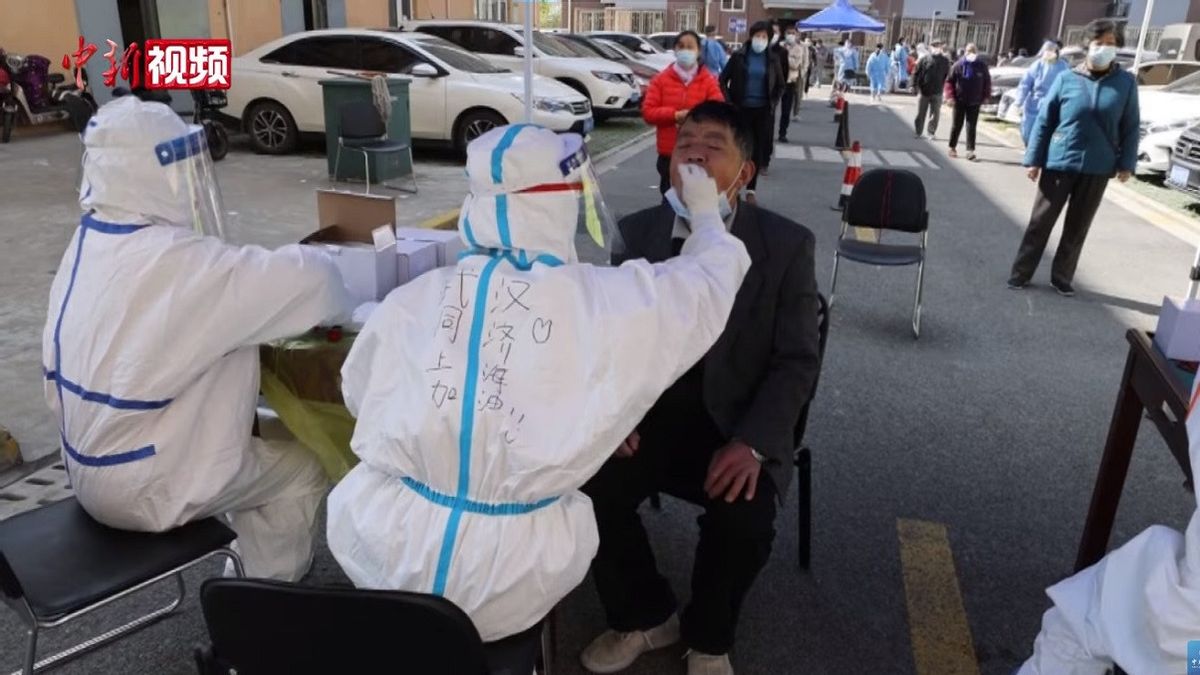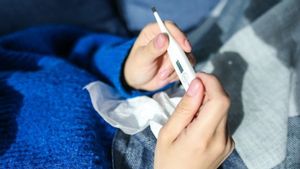JAKARTA - Shanghai's strict lockdown has brought encouraging results, with no new cases of COVID-19 infection detected on Saturday outside the quarantine area, a new milestone in the fight to contain COVID-19 infections.
The sight of houses and buildings surrounded by fences to prevent residents from leaving in Shanghai, has made headlines at a time when most of the rest of the world is learning to live with COVID.
China has maintained a zero-COVID policy aimed at eradicating the disease, which is causing frustration, especially in Shanghai, where many residents have been in lockdown for more than a month.
Some, struggling to find food and other daily necessities, have shown rare public opposition to strict government controls.
However, if the zero-tolerance campaign is successful, it would be a victory for President Xi Jinping's approach within a year.
Shanghai officials did not discuss severing the transmission of COVID at their daily press conference, but social media welcomed the news.
"Shanghai has finally hit zero at the community level!!! May Shanghai wake up soon!!," wrote one post on social media platform Weibo, reported Reuters April 30.
There were no cases Friday outside the quarantine area in Shanghai compared to 108 for Thursday. Some, however, played down the milestone, noting that a large proportion of the city's residents were confined to some form of quarantine.
On Saturday, health authorities said there were nearly 16,000 closed areas in Shanghai, with more than 4 million people prevented from leaving their homes. A further 5.4 million people were barred from leaving their complexes.
In practice, many residents remaining in low-risk prevention areas are still not allowed to leave their compound.
"The city's epidemic control and prevention are currently still in a critical state, and people still need to strengthen control," said Zhao Dandan, deputy director of the Shanghai health commission.

The fight to curb the highly contagious Omicron variant in Shanghai has incurred high costs for the economy, with logistics chains hampered by the restrictions.
China's factory activity in April shrank at its fastest rate in 26 months to its lowest since the early months of the pandemic, first detected in central China, as lockdowns halted industrial production and disrupted supply chains.
Data released on Saturday raised fears of a sharp slowdown in the second quarter that would weigh on global growth. Shanghai officials, who have said they want factories back to work, said more than 80 percent of the 666 companies prioritized had restarted production and they had compiled a second list of 1,188 companies.
Shanghai reported 47 COVID-19 deaths on Friday, down from 52 the previous day. Some have questioned the death rate, as many residents said relatives or friends had died after contracting the coronavirus in early March.
In contrast to Shanghai, Beijing's streets were deserted at the start of the five-day Labor Day holiday, with residents anxious that authorities would impose further restrictions during the holiday when many people normally travel or socialize.
"You see a city that was once bustling and now empty. You wonder how these people managed to survive," said Li, 35, who works in the financial sector in Beijing, tearfully.
The infections subsided as China entered the Labor Day break, which runs through Wednesday, which is traditionally one of the busiest tourist seasons.
Some observers say authorities have been less stringent in getting people to take tests in recent days. However, Beijing's local government said residents must provide nucleic acid test results before going to public places or taking public transport, effective after the Eid holiday.
Theme parks and entertainment venues in the capital are only allowed to operate at half capacity during the Labor Day holiday with advance reservation.
Beijing will also implement two further rounds of COVID tests on May 1 and May 3 in its most populous district of Chaoyang, known for its nightlife, malls and embassies. The city will stop all restaurant dining between May 1 and 4, an official from the local trade bureau said, calling on residents to cook at home.
Officials did not provide a timeline or strategy for a return to normalcy. In response to COVID and other headwinds, China will step up policy support for the economy, the Communist Party's decision-making body said on Friday, lifting stocks from two-year lows. Read more
Beijing has reported 295 new COVID-19 cases since April 22, local health authorities said, of which 123 cases were found in Chaoyang district. Overall, mainland China reported 10,793 daily cases of COVID-19, down from 15,688 new cases the day before, the National Health Commission said on Saturday.
The English, Chinese, Japanese, Arabic, and French versions are automatically generated by the AI. So there may still be inaccuracies in translating, please always see Indonesian as our main language. (system supported by DigitalSiber.id)








